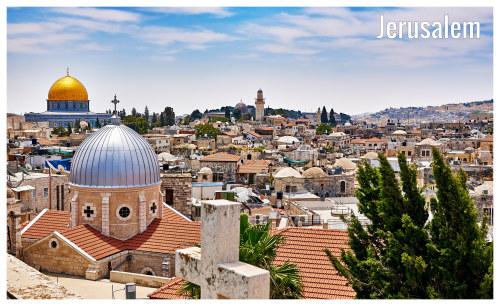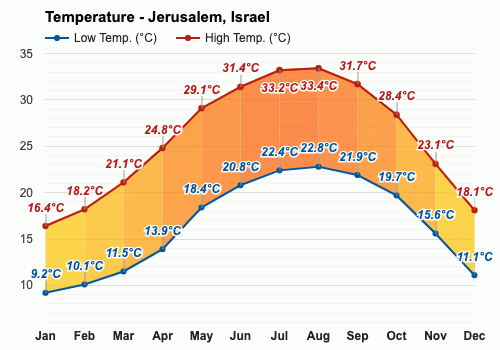Contents
- The climate of Jerusalem
- The best time to visit Jerusalem
- The worst time to visit Jerusalem
- Spring weather in Jerusalem
- Summer weather in Jerusalem
- Autumn weather in Jerusalem
- Winter weather in Jerusalem
- Weather in January
- Weather in February
- Weather in March
- Weather in April
- Weather in May
- Weather in June
- Weather in July
- Weather in August
- Weather in September
- Weather in October
- Weather in November
- Weather in December
- Frequently asked questions
- Average temperature
- Average pressure
- Average wind speed
- Average humidity
- Average rainfall
- Average rainfall days
- Average snowfall
- Average snowfall days
- Average daylight
- Average sunshine
- Average sunshine days
- Average UV index
- Average cloud cover
- Average visibility

The climate of Jerusalem
Temperatures throughout the year can range from lows of 9.2°C (48.6°F) to highs of 33.4°C (92.1°F), presenting differing conditions with each changing season. Relative humidity in Jerusalem generally hovers around the mid-50s, with slight peaks and troughs across the year. Rainfall, predominantly falling between November and March, ranges from 13mm (0.51") to 20mm (0.79"). However, rainfall becomes almost negligible from June to September as the summer months sets in. During these months, the city witnesses a dramatic drop in rainfall days as well.
Days in Jerusalem are longest during the summer months, with up to 14.2 hours of daylight in June and July. Closely mirroring this pattern are the sunshine hours, reaching 12.3 hours in July. The wind speed also varies, from 8.5km/h (5.3mph) to 11.6km/h (7.2mph), with the city witnessing wind gust up to 16.3km/h (10.1mph).
The best time to visit Jerusalem
The worst time to visit Jerusalem
Spring weather in Jerusalem
Summer weather in Jerusalem
Autumn weather in Jerusalem
Winter weather in Jerusalem
Weather in January
Weather in February
Weather in March
Weather in April
Weather in May
Weather in June
Weather in July
Weather in August
Weather in September
Weather in October
Weather in November
Weather in December
Published by: Weather Atlas | About Us
Data Sources | Weather Forecasting & Climate
Frequently asked questions
What are the coldest months in Jerusalem?
What is the most humid month in Jerusalem?
How much does it rain in Jerusalem?
When does it snow in Jerusalem?
How much does it snow in Jerusalem?
What is the month with the least sunshine in Jerusalem?
What are the months with the lowest UV index in Jerusalem?
What is the wettest month in Jerusalem?
When it does not snow in Jerusalem?
When is Daylight Saving Time (DST) in Jerusalem?
What is the least humid month in Jerusalem?
When are the longest days in Jerusalem?
What is the driest month in Jerusalem?
What month has the most sunshine in Jerusalem?
What is the month with the highest UV index in Jerusalem?
What month is the hottest in Jerusalem?
When does it rain in Jerusalem?
What is the snowiest month in Jerusalem?
What is the month with the shortest days in Jerusalem?
Average temperature
Jerusalem, Israel

The warmest month (with the highest average high temperature) is August (33.4°C).
The month with the lowest average high temperature is January (16.4°C).
The month with the highest average low temperature is August (22.8°C).
The coldest month (with the lowest average low temperature) is January (9.2°C).
Average pressure
Jerusalem, Israel

- Average pressure in January:
1018.5mbar - Average pressure in February:
1016.9mbar - Average pressure in March:
1015.3mbar - Average pressure in April:
1013.5mbar - Average pressure in May:
1012.3mbar - Average pressure in June:
1010.1mbar
- Average pressure in July:
1007.3mbar - Average pressure in August:
1008.1mbar - Average pressure in September:
1011.4mbar - Average pressure in October:
1014.3mbar - Average pressure in November:
1016.5mbar - Average pressure in December:
1018.6mbar
The month with the highest atmospheric pressure is December (1018.6mbar).
The month with the lowest atmospheric pressure is July (1007.3mbar).
Average wind speed
Jerusalem, Israel

- Average wind speed in January:
11.6km/h - Average wind speed in February:
11.1km/h - Average wind speed in March:
11.2km/h - Average wind speed in April:
10.3km/h - Average wind speed in May:
10.4km/h - Average wind speed in June:
10.8km/h
- Average wind speed in July:
10.8km/h - Average wind speed in August:
10.5km/h - Average wind speed in September:
9.4km/h - Average wind speed in October:
8.5km/h - Average wind speed in November:
8.8km/h - Average wind speed in December:
10.3km/h
The windiest month (with the highest average wind speed) is January (11.6km/h).
The calmest month (with the lowest average wind speed) is October (8.5km/h).
Average humidity
Jerusalem, Israel

The month with the highest relative humidity is January (62%).
The month with the lowest relative humidity is May (46%).
Average rainfall
Jerusalem, Israel

The wettest month (with the highest rainfall) is March (20mm).
The driest months (with the least rainfall) are July and August (0mm).
Average rainfall days
Jerusalem, Israel

- Average rainfall days in January:
7.2 days - Average rainfall days in February:
7.1 days - Average rainfall days in March:
6.4 days - Average rainfall days in April:
4.4 days - Average rainfall days in May:
2.3 days - Average rainfall days in June:
0.7 days
- Average rainfall days in July:
0.7 days - Average rainfall days in August:
0.1 days - Average rainfall days in September:
1.1 days - Average rainfall days in October:
3.7 days - Average rainfall days in November:
4.9 days - Average rainfall days in December:
6.6 days
The month with the highest number of rainy days is January (7.2 days).
The month with the least rainy days is August (0.1 days).
Average snowfall
Jerusalem, Israel

The month with the highest snowfall is December (2mm).
The months with the least snowfall are March, April, May, June, July, August, September, October and November (0mm).
Average snowfall days
Jerusalem, Israel

- Average snowfall days in January:
0.1 days - Average snowfall days in February:
0.3 days - Average snowfall days in March:
0 days - Average snowfall days in April:
0 days - Average snowfall days in May:
0 days - Average snowfall days in June:
0 days
- Average snowfall days in July:
0 days - Average snowfall days in August:
0 days - Average snowfall days in September:
0 days - Average snowfall days in October:
0 days - Average snowfall days in November:
0 days - Average snowfall days in December:
0.1 days
The month with the highest number of snowfall days is February (0.3 days).
The months with the least snowfall days are March, April, May, June, July, August, September, October and November (0 days).
Average daylight / Average sunshine
Jerusalem, Israel

- Average daylight in January:
10h and 2min - Average daylight in February:
11h and 1min - Average daylight in March:
12h and 0min - Average daylight in April:
13h and 0min - Average daylight in May:
13h and 5min - Average daylight in June:
14h and 1min
- Average daylight in July:
14h and 0min - Average daylight in August:
13h and 2min - Average daylight in September:
12h and 2min - Average daylight in October:
11h and 2min - Average daylight in November:
10h and 4min - Average daylight in December:
10h and 1min
The month with the longest days is June (Average daylight: 14h and 12min).
The month with the shortest days is December (Average daylight: 10h and 6min).
- Average sunshine in January:
6h and 3min - Average sunshine in February:
6h and 4min - Average sunshine in March:
8h and 2min - Average sunshine in April:
11h and 2min - Average sunshine in May:
12h and 0min - Average sunshine in June:
12h and 1min
- Average sunshine in July:
12h and 2min - Average sunshine in August:
12h and 1min - Average sunshine in September:
10h and 1min - Average sunshine in October:
9h and 4min - Average sunshine in November:
7h and 4min - Average sunshine in December:
6h and 5min
The month with the most sunshine is July (Average sunshine: 12h and 18min).
The month with the least sunshine is January (Average sunshine: 6h and 30min).
Average sunshine days
Jerusalem, Israel

- Average sunshine days in January:
22.8 days - Average sunshine days in February:
20.1 days - Average sunshine days in March:
24 days - Average sunshine days in April:
25.5 days - Average sunshine days in May:
27.2 days - Average sunshine days in June:
28.7 days
- Average sunshine days in July:
30.8 days - Average sunshine days in August:
30.7 days - Average sunshine days in September:
28.6 days - Average sunshine days in October:
24.9 days - Average sunshine days in November:
23 days - Average sunshine days in December:
23.2 days
The month with the most sunshine days is July (30.8 days).
The month with the least sunshine days is February (20.1 days).
Average UV index
Jerusalem, Israel

The month with the highest UV index is July (UV index 8).
The months with the lowest UV index are January, February and December (UV index 4).
Average cloud cover
Jerusalem, Israel

The month with the most cloud cover is January (Cloud cover 26).
The months with the least cloud cover are June, July and August (Cloud cover 3).
Average visibility
Jerusalem, Israel

The months with the highest visibility are January, February, March, April, May, June, July, August, September, October, November and December (10km).
The months with the lowest visibility are January, February, March, April, May, June, July, August, September, October, November and December (10km).
Jerusalem, Israel
Weather forecast for your location
2. Allow the app to use your location


